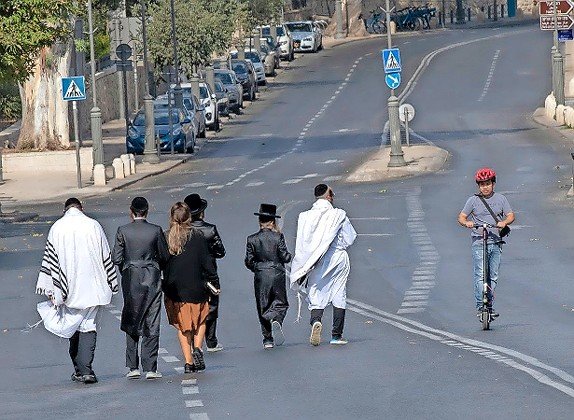Yom Kippur is, of course, special. In Medinat Israel, it’s even more so.
Yom Kippur is the “Sabbath of Sabbaths,” the holiest day on the Jewish calendar, a day of atonement devoted to fasting, introspection and prayer.
As on any Sabbath, Torah-observant Jews refrain from using electronic devices and will not drive their motor vehicles. But in the Jewish state, this national holiday is unique because regardless of religious beliefs, virtually no one drives. It’s not illegal to drive on Yom Kippur, it’s just how Israelis agree to acknowledge the holiday.
“Yom Kippur in Israel is, by law, a ‘buy-nothing day.’ By popular choice, it’s also a ‘car-free day.’ The entire urban environment is transformed, and the normally car-choked streets are reclaimed by the people,” writes Dr. Jeremy Benstein, a leading Israeli environmentalist.
“This change results in 99 percent less pollution, according to some researchers, less noise, and feelings of expansiveness and community.
“The city becomes a village again. People walk and children ride bikes where cars would ordinarily drive, enjoying one another and their surroundings in ways impossible the rest of the year.”
•Most Israeli Jews fast for 25 hours
Who’s fasting? An estimated 60.5 percent of Israeli Jews above the age of 12 for girls and 13 for boys. Another 5 percent drink liquids but don’t eat food.
Fasting on the Day of Atonement “makes us more like angels who are higher beings without physical needs,” explains Rabbi Zev Shandalov, author of “The 3 Images: True Stories and Lessons for Introspection,” a new book geared to the High Holidays.
•People leave their phones off
According to World Data info from 2020, Israelis own 12.27 million mobile phones, or an average of 1.3 per person (more than the 1.1 phones per person in the United States).
Nevertheless, most Israeli switch them off during Yom Kippur — observant Jews because it’s prohibited, and secular Jews because a phone ban enhances the day’s unique aura of peace and quiet.
•The holiday ends with a shofar blast
While blowing a ram’s horn is mandated on Rosh Hashana, on Yom Kippur it is customary for a designated shofar-blower to sound the horn in the synagogue to announce the end of the long day of fasting, prayer and introspection.
According to a 2019 survey, 12% of Jewish Israelis go to synagogue only to hear the shofar. Nearly a quarter planned to attend the entire synagogue service and another 19% planned on attending some of it.
•Bike sales soar before the holiday
Informal surveys show that bicycle sales in Israel go up anywhere from 20 percent to 100% in the days before Yom Kippur, with children’s bikes the hottest commodity. Bike shops often run “Tishrei holidays” promotions.
In Tel Aviv, Yom Kippur is the one day of the whole year that the public Tel-O-Fun bike-rental service does not operate. Anyone can rent a cycle just before the holiday begins — but they’ll have to keep the bike for 25 hours.
•Births soar after the holiday
A study published by physicians at Jerusalem’s Shaare Zedek Medical Center in 1983 confirmed scientifically what everybody already knew: the Yom Kippur fast can trigger labor in the advanced stages of pregnancy.
In 2021, Shaare Zedek — which has the busiest maternity wards in Israel — recorded 64 births on Yom Kippur and 89 births the next day, compared to a daily average of 50 to 60 at its two campuses.
•Water and fruit best for break-fast
Although many American Jews break the fast with bagels and lox, there’s no required menu for the meal.
The Israeli Ministry of Health’s guidelines to “smart and healthy nutrition be-fore and after for a milder Yom Kippur fast” recommend avoiding salty foods and caffeinated drinks beforehand, and breaking the fast gradually with a cup of water and a date or other fruit, then waiting half an hour before eating a light meal.
This Israel 21c report was supplemented by The Jewish Star.

 44.0°,
Mostly Cloudy
44.0°,
Mostly Cloudy 




